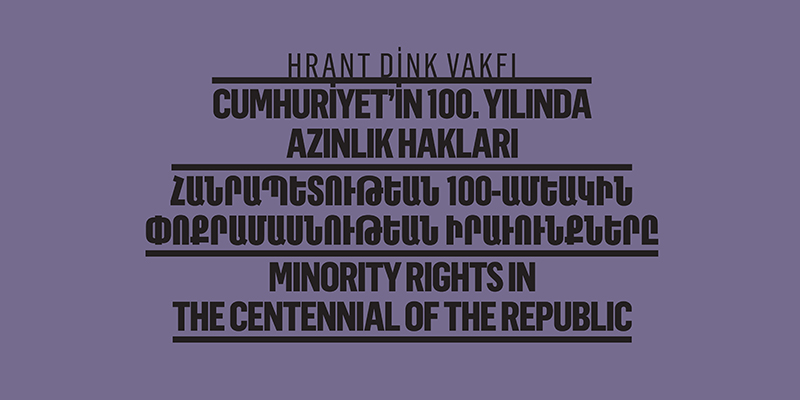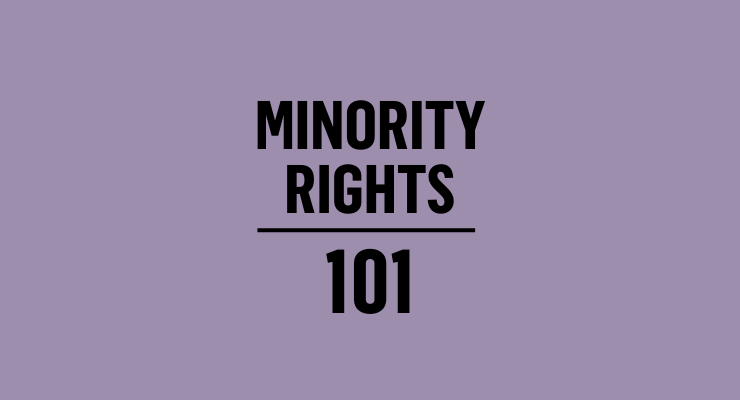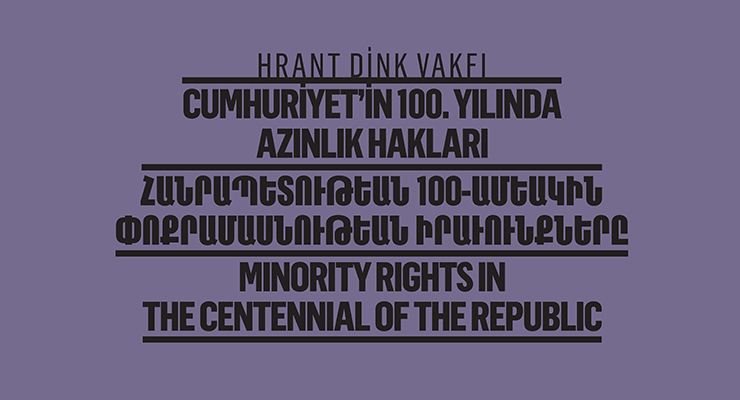The Hrant Dink Foundation will organize an international conference titled ‘Minority Rights in the Centennial of the Republic’ on November 17-18, 2023 in Istanbul. The conference seeks to analyze in detail the rights of individuals belonging to ethnic, religious and linguistic minorities, the problems faced by minorities living in Turkey, and the solutions to these problems.
One of the main themes of the conference is the historical and conceptual development of minority rights and practices in different countries. The legal concept of minority, which historically emerged in the context of protecting the rights of religious communities in Europe, has undergone many transformations over the years. With the rise of nationalism, the concept of minority has been expanded and redefined to include ethnic and linguistic minorities. In recent years, it has been emphasized that in addition to being protected, minorities should be empowered. Different practices have also emerged in different countries and regions, and some of these have set an example for other countries. Under this theme, issues such as the definition of the concept of minority, its transformations, the cornerstones of those transformations as well as country-based differences will be discussed.
The second principal theme of the conference is the development of minority rights in Turkey and the problems experienced. Turkey, one of the nation states established after the collapse of the Ottoman Empire, accepted the international guarantee of the rights of persons belonging to the Greek, Armenian and Jewish communities in the country as minorities with the Treaty of Lausanne it signed in 1923. Although the minorities were defined mainly as religious communities in the Treaty, Syriacs despite being non-Muslims, Turkish/Kurdish Alevis, who have a relatively large population, and Nusayris (Alawites) have not been accepted as religious minorities. In addition, the tensions experienced in the bilateral relations between Turkey and Greece in the last century led to the violations of the rights of Greeks in Istanbul and of Muslims in Western Thrace as a result of the implementation of the ‘reciprocity’ rule in international relations. Thus, persons belonging to the Greek minority, who are the citizens of the country, were subjected to discriminatory policies as a result of the realization of the principle of ‘reciprocity’.
The cultural heritage of non-Muslim minorities, who have been under a certain guarantee with the Treaty of Lausanne, was destroyed, properties owned by the pious-foundations of those minorities were confiscated and seized in certain periods, and people belonging to these communities were culturally and economically discriminated against. Likewise, different minority groups such as Kurds and Alevis experienced similar problems and faced obstacles in speaking their language and practicing their religion without any restriction or discrimination. Although some improvements were made in the 2000s thanks to the adjustment process with the European Union, Turkey still lags far behind international standards on minority rights. Because of these practices, the rate of non-Muslim minorities in the total population which was 2.5 percent in the 1927 census dropped to one per thousand. Under this topic, issues such as the rights of the individuals belonging to different minority communities in Turkey, the transformations of these rights, the problems that minorities face, as well as international developments and their impact on minority rights will be discussed.
The final prevailing theme of the conference is civil society and the fight against discrimination. Under this topic, counter-strategies that can be developed to combat discriminatory policies, to recognize minority rights and to solve problems as well as the role of non-governmental organizations in this context will be discussed.
During this two-day conference which will be held within the scope of the ‘Minority Rights Academy’ project carried out by the Hrant Dink Foundation, the following topics will be addressed:
- The concept of minority and its historical development
- International treaties and conventions protecting and promoting minority rights
- Comparative studies on minority rights
- The rights of indigenous people
- The minority policy of Turkey
- The main challenges minorities in Turkey face
- Regional conflicts and minorities
- ‘Reciprocity’ rule in international relations and minorities
- Hate speech and minorities
- Practices of discrimination against minorities
- Cultural heritage and minorities
- Education, culture, art and minorities
- Ecology and minority rights
- The role of NGOs in the protection of minority rights
- Counter-strategies to tackle discrimination
Conference Details:
- The working languages of the conference will be English and Turkish. Simultaneous interpretation will be provided.
- Application abstracts should be submitted in English only.
- Presentations are limited to 20 minutes in order to have time for the Q&A session and discussions.
- The conference will be live streamed on www.hrantdink.org.
- Transportation and accommodation expenses of participants will be covered.
- The conference will be of an ‘interdisciplinary’ nature. It is open to the participation of researchers studying minority rights from various disciplines including history, sociology, law, international law, political science, anthropology, and cultural studies.
- A selection of the papers presented at the conference will be published by Hrant Dink Foundation Publications in the form of conference proceedings.
- Researchers who would like to participate in the conference are kindly requested to complete the form below and submit a 250-word abstract of their original papers including the title and key sources, along with a 150-word resume that includes their date of birth, educational background (e.g., undergraduate, graduate, and PhD degrees), fields of study, books published, and ongoing research by 1 June 2023.
- The abstracts will be reviewed and selected by the Academic Commiteee.
Academic Committee:
Samim Akgönül, Strasbourg University
Ayhan Aktar, Istanbul Bilgi University
Anna-Mária Bíró, Tom Lantos Institute
Lerna Ekmekçioğlu, Massachusetts Institute of Technology
Ayşe Kadıoğlu, Sabancı University
Ohannes Kılıçdağı, independent scholar
Yael Navaro, Cambridge University
Baskın Oran, professor emeritus
Christine M. Philliou, University of California, Berkeley
Konstantinos Tsitselikis, University of Macedonia
Mesut Yeğen, independent scholar
Please click for the application form

This project is financed by the European Union.



